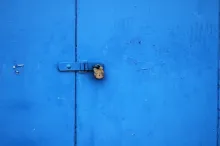UPC – the great paradox: why the CJEU could bring in "uniform protection" and "equal effect" when interpreting the EU's "external" patent law (e.g. TRIPS), notwithstanding the futile efforts at keeping its grubby little hands off "internal" patent law
June 20, 2022
Readers who have followed our last two blog entries and the vast number of comments received, will have seen the following two conclusions surfacing. First, although the UPC 's Protocol on Provisional Application, in reality, may not be in force, there is nothing to worry about because there are no police around. Second, there is nothing to worry about, either, in the crystal-clear wording of articles 7(2) and 89 of the UPCA, because the rule of law will be an accidental feature of the UPC edifice. The important thing will be the creative interpretations devised by a bunch of people holed up in a dark room with bullet-proof walls (rectius, transparency-proof) for the purpose of preventing ordinary European citizens and small and medium size enterprises from having a say on where the UPC should be heading after Brexit.
As a sidenote, may we recommend that readers peruse the exchange of views that followed our last blog (19 May 2022), on the primacy of EU law over international treaties or the other way round. Certainly, it is a fascinating topic that, as usual, the EU Council Legal Service tried to sweep under the rug when it initially deleted footnote 23 from its opinion of 21 October 2011 regarding the compatibility of the amended UPCA with Opinion 1/2009.
Today we will move on to a different topic, which is the removal of articles 6-8 (i.e. substantive patent law) from the text of draft Regulation 1257/2012 (the "Regulation"). As readers are well aware, the objective of removing substantive patent law from the text of the Regulation was to try to prevent the CJEU from getting its -to put it mildly- grubby little hands, on the new European patent with unitary effect. It is an irony of destiny that the Prime Minister who played such a crucial role in achieving that removal was leading a country that is no longer an actor in the UPCA theatre. In any event, the result of such removal is that the European patent with unitary effect will have anything but "uniform protection" and "equal effect," as the effect and protection will be determined by the national law applicable to the particular patent at hand. In short, this means that, at least conceptually, different patents may have different protection and different effects, depending on whether the patent at hand is subject to, say, German or to Portuguese law. Under this light, the use of the expressions "uniform protection" and "equal effects" in article 3.2 of the Regulation is another of the very amusing features of this project. The same applies to article 5 ("uniform protection"), a title that, for the reasons explained elsewhere, appears to have been chosen by Groucho Marx (see "La Patente Europea con Efecto unitario y el Tribunal Unificado de Patentes: de la anhelada patente de la Unión Europea a la "descomunitarización" del Derecho Europeo de Patentes", in Colección de trabajos en conmemoración de los 50 años (1963-2013) del grupo español de la AIPPI, Spanish Group of AIPPI (2015), p. 629-719.)
The great paradox of all this is that the only institution that would be able to bring in the "uniform protection" and the "equal effects" required by the Regulation for European patents with unitary effect is precisely the CJEU. We already flagged-out this alert for seafarers a few years ago (in "The Practical Consequences of the CJEU Judgment of 18 July 2013 Changing Its Doctrine on the Respective Competences of the EU and its Member States to Apply the TRIPS Agreement: Have We Seen the Tip of the Daiichi Iceberg Yet"?, in IIC (2017) 48:784-812).
As that article explains, in 2012, the European Commission was conspiring with the other political institutions and the EU Member States to remove, from the CJEU's agenda, the ability to interpret "internal" patent law (i.e. original articles 6-8 of the Regulation). In parallel, the Commission was persuading the CJEU to take over the competency to interpret "external" patent law (e.g. TRIPS). It was successful, as shown by the Judgment of 18 July 2013, where the CJEU, in changing its previous long-standing doctrine, declared that it had competence to interpret TRIPS. As mentioned above, the great paradox of all this is that the EU political institutions and the Member States' successful efforts at removing substantive patent law from the Regulation did not take into account that, notwithstanding these efforts, substantive patent law may end up on the CJEU's desk through the backdoor, that is, through the interpretation of the patent provisions of TRIPS.
This is because, according to article 24(1) of the UPCA:
"In full compliance with Article 20, when hearing a case brought before it under this Agreement, the Court shall base its decisions on: (a) Union law, including Regulation (EU) No 1257/2012 and Regulation (EU) No 1260/2012; (b) this Agreement; (c) the EPC; (d) other international agreements applicable to patents and binding on all the Contracting Member States; and (e) national law."
The most significant of the ‘‘other international agreements’’ mentioned in letter (d) is precisely TRIPS.
The "external" patent law that falls within the interpretative competence of the CJEU includes not only the "enforcement" provisions of Part III of TRIPS, which have since then become "internal" patent law (i.e. Directive 2004/48), but also "substantive" patent law (i.e. Section 5 of Part II of TRIPS).
In turn, Art. 21 of the UPCA states that:
"As a court common to the Contracting Member States and as part of their judicial system, the Court shall cooperate with the Court of Justice of the European Union to ensure the correct application and uniform interpretation of Union law, as any national court, in accordance with Article 267 TFEU in particular. Decisions of the Court of Justice of the European Union shall be binding on the Court."
In conclusion, as announced in the title of this blog, the great paradox of the futile efforts at trying to keep the CJEU's grubby little hands off "internal" patent law is that only those hands, when interpreting "external" patent law, will be able to bring the "uniform protection" and "equal effect" cherished by the Regulation.
You may also like














Martin
Dear Mr Montañá, thank you for this analysis. I did not follow the TRIPS discussion at the ECHR, and now have some catching up to do.
Adam Brown
Someone could suspect the EPO to have influenced the decision of the European Commission in 2011 to NOT join the EPC, in order to avoid intervention of the CJEU in substantive patent law issues. The fact that the EPO has recruited Mdme Frohlinger in April 2012 might be interpreted by some as "pantouflage", she was offered to finish her carreer at the EPO after the Commission bowed to the demand NOT to join the EPC. The EPO does not want the CJEU to intervene in its dirty independent kingdom, Aka Eponia.
Mike Snodin
Miquel, I quite agree that the CJEU will likely have a significant influence on the development of UPC case law. However, before considering how the CJEU might rule on matters concerning “uniform protection” and “equal effect”, is there not a more fundamental question to answer? That is, because established CJEU's case law could be seen to cast doubt upon pronouncements in the UPCA (and Regulation 524/14) that the UPC is "a court common to the Member States", do we not first need to establish whether the UPC is indeed capable of making preliminary references to the CJEU under Article 267 TFEU? I am losing count of the number of questions relating to the UPC that are highly significant to how (or even whether) the UPC will operate, but where there is huge uncertainty regarding how those questions might be answered. Indeed, in view of AO's comments on the previous thread, it seems to me that the list now includes questions regarding the constitutionality of "forced intervention" under Rule 316A UPCA. Being dragged into proceedings at the UPC against one's will reminds me of another question that has been bothering me. The question is: how might challenges to the validity of opt-outs (under Article 83(3) UPCA) be resolved? The reason that this bothers me is that: - my understanding is that the whole point of filing an opt-out is to escape the jurisdiction of the UPC; but - if, as I understand will be the case, the validity of an opt-out can be challenged, even the proprietor of a patent for which a valid opt-out has been filed could be drawn into an action (however short) before the UPC. This makes me question whether it can possibly be right for challenges to the validity of opt-outs to be determined by the UPC. Indeed, it seems to me that: - challenges to the validity of opt-outs are NOT included in the list of actions in Article 32(1) UPCA as falling within the exclusive competence of the UPCA; and - according to Article 32(2) UPCA, the national courts of the Contracting Member States must therefore remain competent for such actions. I would have thought that, in principle, a court established by an international treaty cannot expand its jurisdiction / competence beyond that afforded to it by the treaty. If this is correct, then even if it was an inadvertent oversight to omit actions regarding opt-outs from Article 32 UPCA, this lack of competence can only be resolved by amendment of the UPCA (and NOT by amendment of the Rules of Procedure). In any event, it seems to me that the national courts of the Member States ought to be perfectly capable of determining the validity of opt-outs ... much as they are perfectly capable of interpreting and applying other international treaties relating to patents (such as TRIPS and the EPC) that their governments have signed and ratified.
Implicitly but necessarily and specifically
Having seen the complete mess that the CJEU has made of the law on SPCs, I shudder to think what might happen if it were to get its hands on substantive patent law. Under the EPC and the established case law of the Boards of Appeal, we have a (mostly) settled, (mostly) consistent and (mostly) sensible approach to the most common substantive issues. Unless the CJEU undergoes wholesale reform to introduce a specialist IP chamber with appropriate legal and technical expertise, it should be kept well away from such matters.